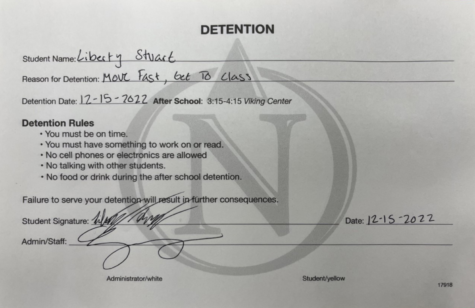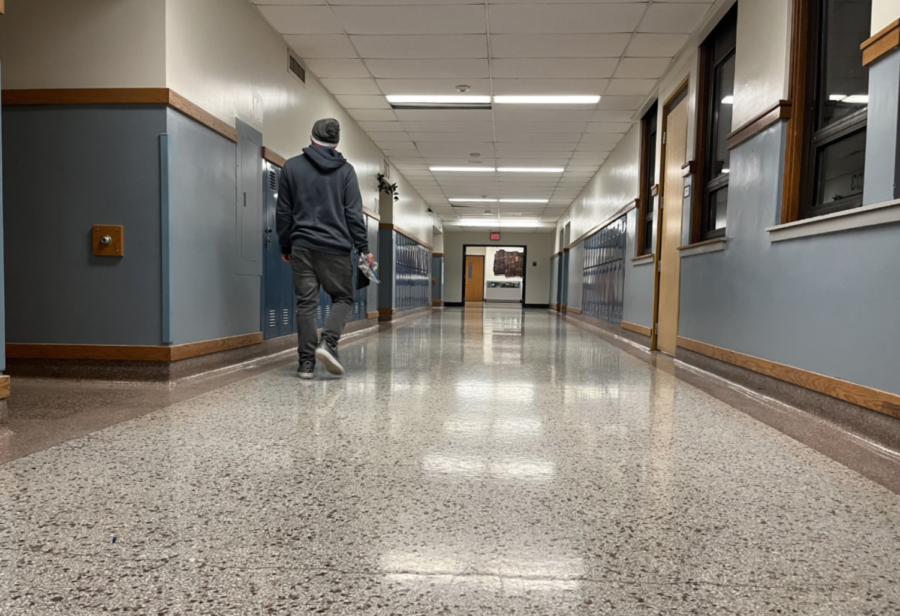Move fast, get to class
Omaha North High School student walks down the hallway. Administration has recently started cracking down on tardies. PHOTO BY LIBERTY STUART
December 16, 2022
Operation Get to Class replaces hall sweeps
Omaha North High School has experienced a constant issue with students being tardy to class and skipping in the hallways. This year, in order to fix the problem, administrators switched their tardy protocol to a new system called Operation Get to Class.
The old process of hall sweeps required staff to make a school- wide announcement telling teachers to lock their doors. Administrators would then find the students left in the hallways and hand them a paper assigning them a detention.
“I’ve seen kids rip the detention up right in front of
the administrator, so it has to be consistent. We can’t keep letting it happen, but a lot of the kids just don’t care unfortunately,” said Reginald Jamerson, a security guard at Omaha North High School.
Jamerson added that “We don’t have the staff to chase everybody down,” which, along with the low turnout of students in detention, is why the school decided to adopt the new policy.
“With the hall sweeps, we were assigning anywhere between
40 to 60 people a detention, and attendance was not great,” said Tara Oxley, Dean of Students.
The original Operation Get to Class system used the students’ online attendance records to determine which students were late to a class. The administrators chose a block, and every student who was tardy during that block received an e-mail assigning them a detention.

However, the system was changed in late October to target less students who missed a class due to unforeseen circumstances.
The new system only gives consequences to students who have four or more tardies in a week, because “we figure everyone’s going to be tardy at least every once and a while, but by the time you’ve been tardy four times in a week, that’s a pattern of behavior that’s starting to emerge,” said Oxley.
“Everybody is late from time to time, and this gives you a little bit of a cushion, but it’s going to very quickly separate the kids that are late by choice as opposed to the kids that dropped their books in the hallway, or the line for the restroom was super long, or things like that…I don’t want this to become a punishment for accidents or things that are out of your control.”
The amount of tardies someone has, excluding school absences, in a week determines their consequence.
If a student has four of five tardies, they receive one late school detention. From six to eight, they must do two back-to-back detentions on either a Tuesday and Wednesday, or Wednesday and Thursday. Students with nine to ten will spend an entire day in SSC room.
Finally, if a student has 11 plus tardies in a week they must go to Saturday school, which is a new program that runs from 8-10 a.m. on Saturdays. Students will have to be in the building with Principal Dr. Collette Nero.
“They are cracking down a little bit harder, kids are going home. There are bigger consequences for skipping,” said Jamerson.
After a student misses a detention, the staff contacts their families one more time. If they avoid the consequence after that, they receive a two-day suspension.
“We’re working with people, the goal isn’t to send you home, the goal is to get you to go to class,” said Oxley.
Students Lafayette Nelson, 11, and Tay’Veon Dukes, 11, both received detentions under this policy. They both said that the system was annoying, but they have contrasting opinions on its effectiveness. Nelson feels that the new policy isn’t going to make a difference and students “still not gon want to go and still gon be out in the hallways, it really don’t matter.” Dukes, on the other hand, believes the new policy will be able to keep kids in class.
“I think it’s a good policy because if they do get assigned a detention and they don’t go to it, they get suspended, so I mean, I think giving after school detention, people have stuff to do after school they not about to let after school detention get in the way of that, so I feel like it’s going to make them go to class more,” said Dukes.
During the few months that Operation Get to Class has been in effect, Oxley has said that she and fellow Dean of Students, Skylar Johnson, have both noticed a decrease in the number of students that are receiving a detention.
“If I had to estimate, I went from having 30-35 names to having around 15 or so, either that or last week was just a fantastic week for being on time,” said Oxley.
Although Operation Get to Class is still new this year, Oxley and Jamerson are hopeful.
“It will be worth it in the long run if it will get students to go to class and be where they’re supposed to be,” said Oxley.










